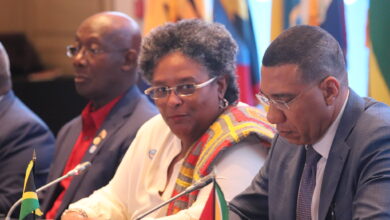- Dr. June Soomer, Chairperson; United Nations Permanent Forum on People of African Descent;
- Distinguished Members of the Permanent Forum;
- Representatives of Member States and Civil Society;
- Ladies and Gentlemen.
I bring warm Caribbean greetings from the Caribbean Community (CARICOM) to this esteemed gathering, as you conclude the Third Session of the Permanent Forum on People of African Descent.
I extend heartfelt congratulations to my sister Dr. June Soomer, a most distinguished citizen of our CARICOM Member State, Saint Lucia, on her appointment as Chairperson of this body, and assure her of the Community’s full support. I also recognise and express deep appreciation to Dr. Epsy Campbell Barr for her pioneering stewardship of the Permanent Forum for the past two years.
In a relatively short time, and with limited resources, the Permanent Forum has established itself as a respected, relevant and consultative body. CARICOM supports its work in advancing a progressive agenda for dismantling structural racism and advocacy for the human rights of people of African descent. I commend the Forum on its achievements to date and join the call for more resources for you to effectively undertake your important and extensive mandate.
I am pleased to note that reparatory justice and economic justice have been germane to discussions during this Third Session. Over the past decade, under the leadership of Chairman Professor Sir Hilary Beckles, the unwavering advocacy of the CARICOM Reparations Commission has reinvigorated a compelling global movement for reparatory justice for the crimes against humanity of native genocide and chattel enslavement. The reparations agenda as set out in the CARICOM Ten Point Plan for Reparatory Justice has been accorded priority attention by CARICOM, with the Honourable Mia Mottley, Prime Minister of Barbados, chairing the Prime Ministerial Sub-Committee on Reparations. Reparatory justice is an imperative for sustainable, inclusive development in the global south.
Within CARICOM, we are committed to changing the things we cannot accept. This is why, fundamentally, in the context of the crises in Haiti, we continue to support efforts to find solutions led by Haiti to restore peace and democracy to the Haitian people. Reparations are more than overdue to the people of Haiti who have already paid twice for their freedom from enslavement, which was won in the Haitian Revolution, after which the free Republic of Haiti was required to pay reparations to the former slave owners.
As the International Decade for People of African Descent comes to a close this year, I am pleased to convey that Heads of Government of CARICOM have expressed their full support for the observance of a Second Decade by the international community. The increasing global recognition of CARICOM’s call for reparatory justice, as well as the establishment of the Permanent Forum, are valuable outcomes of the current Decade. However, we recognise that we are yet to realise the fundamental objectives of impacting the material condition, security and dignity of African descended people, particularly women and girls who continue to be the most marginalised groups.
A thorough evaluation of the current Decade and the declaration of a Second Decade by the General Assembly, with the requisite funding for effective implementation, are therefore critical next steps. It would also be extremely beneficial if the United Nations would convene a High-Level Political Forum on Reparatory Justice, so that a comprehensive agenda of repair, to include climate justice, may be appropriately ventilated.
To this end, CARICOM is willing to partner with all nations, intergovernmental bodies and civil society groups that share our conviction and uphold the principles of the Durban Declaration and Programme of Action.
As small nations of the global south, we understand deeply how important it is to work together on issues that are fundamental to our very existence as free societies. I encourage everyone to work together to eradicate racial discrimination, and I wish the Permanent Forum continued success as we collectively advance our agenda of building inclusive, equitable societies.
Thank you, ladies and gentlemen.






